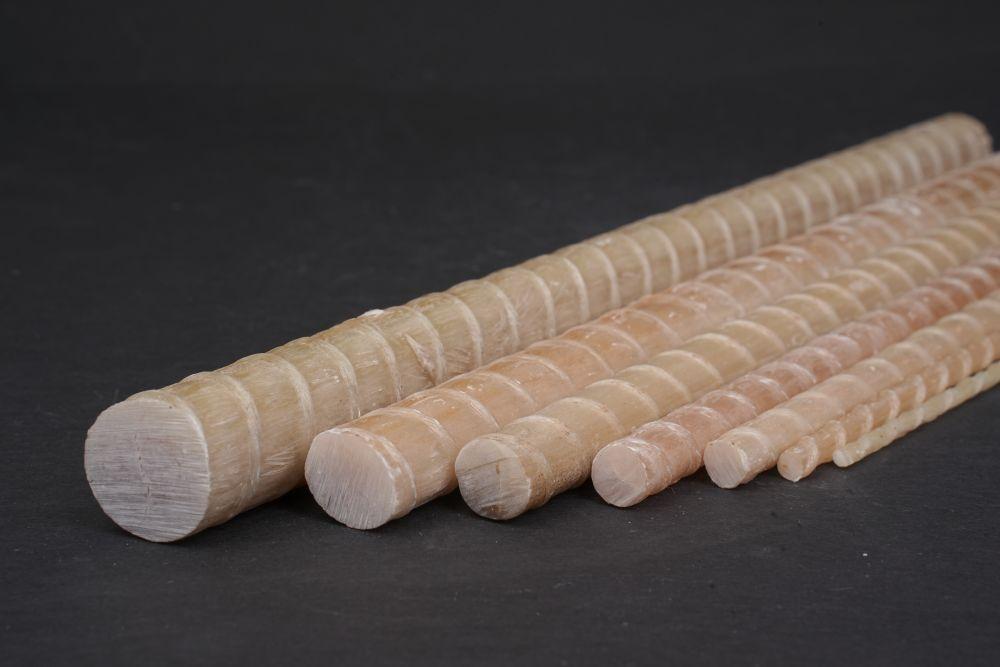- +919659859896
- india@mrg-composites.com
- We Ship Worldwide
- Download Company Profile
ISO 9001:2015 Certified

Strength
Understanding Strength: The Construction Problem
Modern construction relies heavily on strength attributes to maintain buildings under permanent use conditions. The construction industry tackles three enduring issues including environmental pressure together with structural wear-out and material damage. The lifetime costs of projects increases because steel material suffers from corrosion and requires intensive maintenance in environmental conditions. The requirements for improved reinforcement solutions become evident because GFRP Rebar provides a superior combination of strength with durability.
How Strength Matters in Construction
Construction projects depend on their strength to guarantee safety together with better durability and economic performance. The materials involved in bridge and building construction and highway and marine construction need to demonstrate reliable performance under stress and environmental conditions and weight-bearing loads. The structural integrity suffers when weak materials or insufficient reinforcement measures are used because they make structures vulnerable to significant damage. GFRP bars enable engineers and builders to attain both reliable structural performance and assurance about their work because of these materials’ selection capabilities.
How does corrosion affect construction?
- Structural Integrity: Corrosion weakens the construction, leads to cracks, and reduces load-bearing capacity.
- Increase maintenance cost: corrosion weakens the construction. So, the construction requires regular maintenance, increasing the maintenance cost and time.
- Short construction lifespan: Coronavirus damages the construction, requiring regular maintenance or replacements. Builders need to rebuild the structure, which also increases the cost of construction and time.
Builders and contractors need a material that resists corrosion and provides lasting durability. GFRP Rebar completes this requirement, offering more strength and lighter corrosion resistance at lower prices.
What Is GFRP Rebar?
GFRP Rebar, or Glass Fiber Reinforced Polymer Rebar, provides exceptional performance capabilities in construction applications. The blended material called GFRP rods incorporates glass fibers with polymer matrix to serve as a steel reinforcement replacement. Modern construction projects use GFRP rebar because it offers corrosion resistance together with high tensile strength and lightweight properties that represent a substantial improvement.

Key Features of GFRP Rebar:
- Strength: GFRP Rebar is 2 times stronger than traditional steel rebar. GFRP Rebar makes the construction stronger. It consists of Glass Fiber and polymer rebar.
- Lighter: GFRP Rebars is ¼ lighter than traditional steel rebar. GFRP Rebar is an ideal choice where weight is major concern. It makes the construction more lighter and provides more strength.
- Corrosion Resistance: Unlike steel, GFRP bars are impervious to rust, ensuring durability in harsh conditions like coastal areas or chemical facilities.
- Non-Magnetic Properties: These materials work optimally in systems which need electromagnetic stability since they do not hold magnetic attraction.
- Extended Lifespan: GFRP offers a prolonged service life span because it retains its structural properties during many decades which decreases the necessity to replace or repair structures.
Why GFRP Rebar is Stronger for Construction
GFRP Rebars demonstrate their strength through physical properties and their capability to resolve enduring construction material problems. These are the main benefits that define GFRP bar superiority:
- Corrosion Resistance: The main factor causing damage to structures results from corrosion. Both water and salts alongside chemicals cannot damage glass fiber reinforced polymer rebars since these materials resist these substances completely.
- Lightweight The lightweight nature of GFRP rebar reduces the total cost of project delivery because it weighs only one-fourth as much as steel materials. It is an ideal choice where weight is major concern such as bridge, marine structure, etc.
- Superior Tensile Strength: GFRP rods deliver exceptional tensile strength capacity which allows them to resist both cracking alongside deformation during applications with demanding load requirements.
- Thermal and Electrical Neutrality: The absence of electrical and thermal conductivity properties in GFRP makes it suitable for particular applications that require this characteristic.
- Cost Efficiency: The initial higher price of GFRP rebar becomes economical due to reduced maintenance requirements and extended service time.
Application of GFRP Rebar: Where Strength Matters
Glass fiber reinforced polymer bars provide the construction industry with indispensable components because of their ability to adapt to multiple needs and their structural strength.
- Durability: GFRP Rebar is a durable construction material. It provides longer life span of construction.
- Corrosion resistant: GFRP rebar is compatible with water, saltwater and other chemicals. It is an ideal choice for marine structure, bridges on water, structures on water.
- Industrial Flooring: Handles heavy machinery and chemical exposure without degradation.
- Premium nonconductivity properties support their safe use in electrically energized underground infrastructure such as tunnels.
- The Indian GFRP rebar manufacturers heavily utilize this material throughout road construction projects because of its excellent performance characteristics in challenging environments.
- Water Treatment Plants: Resistant to harsh chemicals and constant moisture.
GFRP Rebar vs Steel Rebar Strength
The construction industry shows increased favor towards GFRP Rebar as opposed to Steel Rebar due to several noteworthy factors. Construction structures use GFRP due to its higher tensile strength to weight ratio which surpasses the performance of steel for load-bearing applications. GFRP demonstrates resistance to corrosion because it does not deteriorate while steel rebars reduce in strength due to corrosion processes.
Structures reinforced with GFRP exhibit long-term service due to its non-corrosive properties. The material cost of maintaining steel rebars includes rust prevention while GFRP needs no upkeep whatsoever. The thermal conductivity of GFRP remains low which results in thermal stability during temperature fluctuations.
Conclusion
GFRP Rebar stands as an innovative material for construction because it enables stronger and more reliable while maintaining cost effectiveness. GFRP exhibits three key advantages because it combines weight efficiency with high tensile power which surpasses steel reinforcement while withstanding corrosion damage. GFRP bars prove exceptional in every strength-critical infrastructure application including bridges, roads and industrial flooring. Construction projects require sustainable longevity which can be achieved by selecting glass fiber reinforced polymer rebars as an investment.

